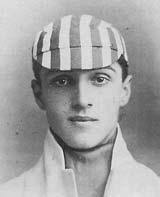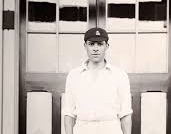This is the story of two cricketers from Kent, whose paths crossed briefly, but whose lives then went in very different directions – one to wealth, fame and power, and the other to an early death.
An email pinged into my in-box the other day, from somebody wanting to know a bit more about the cricketing career of Walter Monckton, lawyer and politician and afterwards the first Viscount Monckton of Brenchley. I knew (the clue was in the title he chose) that Monckton’s home county was Kent (he was born in Plaxtol) but I had no idea about his cricketing skills. It was news to me that he had taken part in the famous Eton v Harrow match of 1910. This game, at the time one of the social highlights of the Lord’s summer, became known as “Fowler’s Match” because Robert St Leger Fowler, an Irishman in his last term at Eton College, having already made 64, the highest score of the match, then took eight wickets for 23 runs in Harrow’s second innings, to secure victory for Eton by nine runs. Harrow were only chasing 55 to win, having been so on top throughout the game that they had forced Eton to follow on. As Wisden remarked, “in the whole history of cricket, there has been nothing more sensational.” Monckton, poor chap, was the Harrow wicket-keeper. He batted at number 6 and made 20 and 0.

Walter Monckton in his cricketing days
1910 was, of course, another Kent championship year, so it was hardly surprising that Monckton, even with his impeccable county connections, did not get anywhere near the Kent side, as several talented schoolboys had done in years before, and it was not long before his desire to qualify as a lawyer took away all prospect of playing cricket seriously. He did play just one first-class match: for the Combined Oxford and Cambridge Universities against the Army and Navy (the services, not the Stores, I assume) in 1911. The match, at the United Services Ground in Portsmouth, resulted in a loss for the universities by six wickets, but Monckton came away with scores of 29 not out and 43, leaving him with a lifetime first-class batting average of 72. Compare this with Steve Smith or Sachin Tendulkar (both just under 58) or George Headley (just under 70). There’s only Bradman, of the big runscorers, ahead of him.
Monckton went on to enjoy a legal and political career which took him from being Recorder of Hythe to being appointed Minister of Defence and Paymaster General in Anthony Eden’s cabinet. He also advised Edward VIII during the abdication crisis of 1936, and thus is portrayed by the actor George Asprey in the TV series, The Crown. We perhaps should overlook the fact that he became President of Surrey CCC (why? how?) in 1950 to 1952 and then again from 1959 to 1964. He died, full of years and honours, in 1965.
Monckton also played a few times for Kent 2nd XI, including a match against Cornwall at Hythe, in July 1911. Kent 2nds won this match by an innings and 62 runs, largely thanks to a partnership of 280 for the third wicket between the captain – and future Kent county captain – Lionel Troughton, and a man that I knew very little about, David Jennings.
In that match for Kent 2nds, Troughton opened the batting and made 134, but Jennings, coming in at number four, hit a brilliant 173 out of their partnership of 280 in two and a half hours, before both men were dismissed with the score on 366. Jennings hit 29 fours, and their partnership set a new Minor Counties Championship record for the third wicket. Monckton made 18 not out and took two catches. Jennings had been playing for Kent 2nds since 1908, and had played a handful of games for the first team, making his debut in 1909 against Surrey at the Oval, but before 1911 he could not be regarded as anywhere near a regular member of the side.

David Jennings, wearing his Kent cap
David William Jennings born in Kentish Town in 1889 into a cricketing family. His father, also David, played for many years around the turn of the century for Devon, and (together with his wife) produced five sons, of whom David was the eldest. Four of them went on to play first-class cricket – after David there was George, who played for Warwickshire, then Thomas who played for Surrey, and Leonard, who played two first-class games for the RAF. The only brother not to play first-class cricket was Stanley, who played once for Wiltshire in the Minor Counties Championship.
In 1911, David Jennings made three appearances in Kent’s first team, scoring a century and two fifties in five innings and averaging 75 for the season. He was rewarded with his county cap (cap no. 71). However, trying to force your way onto one of the strongest team sheets Kent have ever had is no easy thing, and Jennings was not able to recapture his 1911 form immediately. In 1914, he was picked for eleven county matches and to the end of that summer, he had scored a total of 1064 runs for the county, with three hundreds, at an average of a little over 24. Solid enough figures, if not startling. He was 25 years old and his best years should have been ahead of him.
When war broke out, Jennings joined the Kent Fortress Engineers, along with his eighteen-year-old brother Thomas and Colin Blythe, among others. He spent most of the war in Britain, during which time he played a few games of cricket for the Fortress Engineers alongside Blythe. They both also appeared for the Army and Navy against a combined Australian and South African forces side at Lord’s in July 1917. He opened the batting with Wally Hardinge, and made 11 in what was to prove the final significant match for both Jennings and Blythe.
Corporal Jennings was posted to France in early 1918. On 10 April he was caught up in a German gas attack at Bienvillers, near Arras, and was evacuated back to England a week later. The gas had affected his eyes, his throat and his lungs, and he spent two months recovering in hospital. But just a fortnight after his release from hospital, he was readmitted with pleurisy, and despite the best care the hospital in Tonbridge could give him, his condition worsened and on 5 August 1918, he died. He was 29 years old.
Although his career record may not have been particularly impressive, his Wisden obituary noted that “as a cricketer, Jennings was a trifle unfortunate. Had he belonged to a weaker county than Kent he would no doubt have taken a more prominent position”. Other commentators have said that Jennings’ death was probably the most significant loss the county suffered during the war, because both Blythe and Hutchings, the two more famous casualties of the conflict, had apparently finished their careers, while Jennings, a fine fielder as well as a promising batsman, was still in his prime.
Who knows what he might have achieved if he had been spared?
(With acknowledgements to Paul Lewis and his magnificent book ‘For Kent And Country’)
0 Comments